Analysis of Unit 4 Hospitality Business Toolkit for the Ritz Hotel
VerifiedAdded on 2023/01/13
|12
|3177
|1
Report
AI Summary
This report provides a comprehensive analysis of the Ritz Hotel's business toolkit, covering key aspects of hospitality management. The report begins with an examination of financial performance, including the principles of management, monitoring, and the application of double-entry bookkeeping. It then delves into the HR life cycle, performance management plans, and their implications for resolving problems within the organization. Furthermore, the report identifies relevant legislation, including environmental and food safety regulations, and analyzes their impact on business decision-making. The report also covers the importance of coordinating and integrating departmental functions within the hospitality sector. The analysis includes practical examples and case studies to illustrate the concepts discussed, providing a holistic view of the challenges and opportunities facing the Ritz Hotel. The report aims to provide insights into the strategic management and operational efficiency of the Ritz Hotel, emphasizing the importance of financial management, HR practices, and legal compliance in achieving its goals.
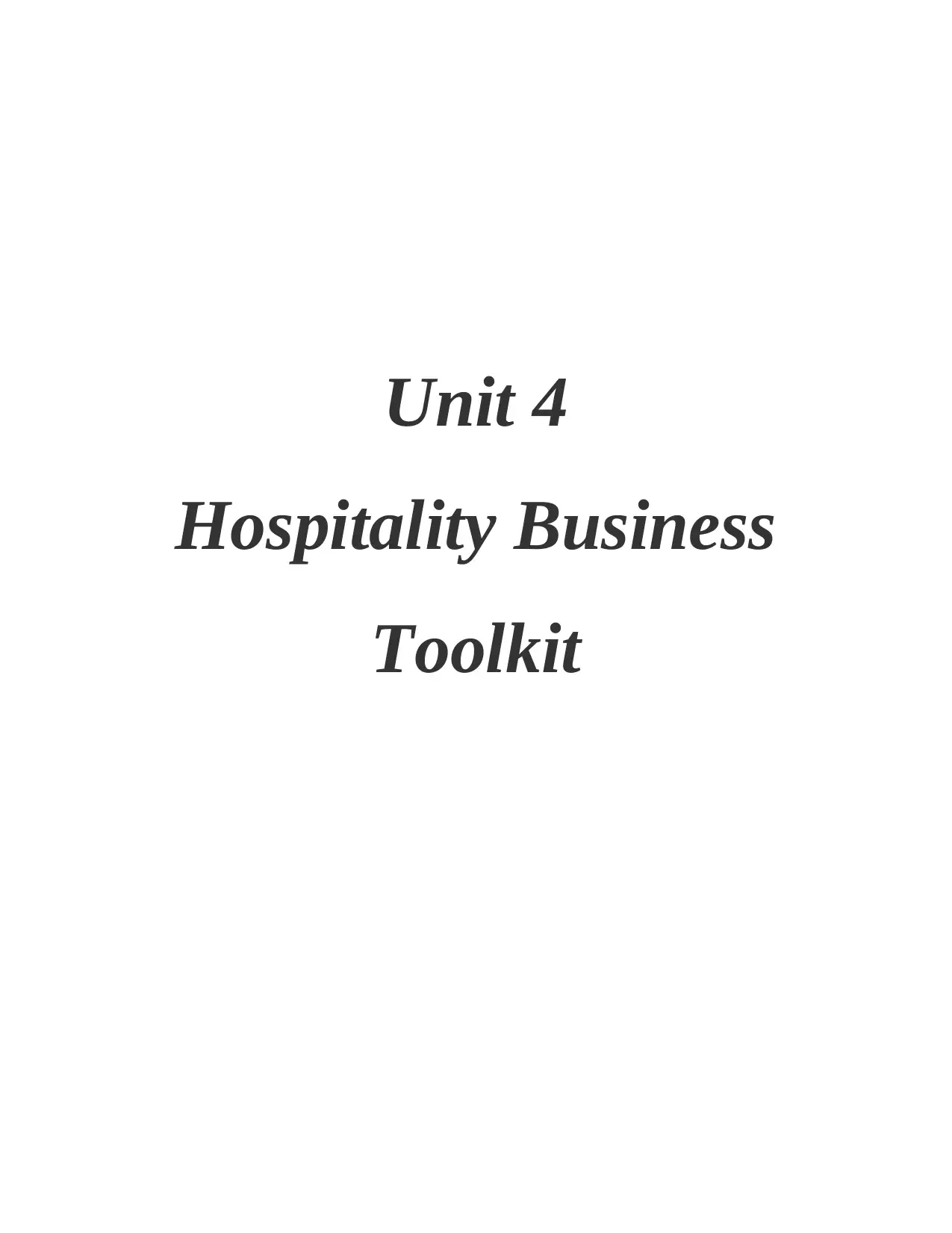
Unit 4
Hospitality Business
Toolkit
Hospitality Business
Toolkit
Paraphrase This Document
Need a fresh take? Get an instant paraphrase of this document with our AI Paraphraser
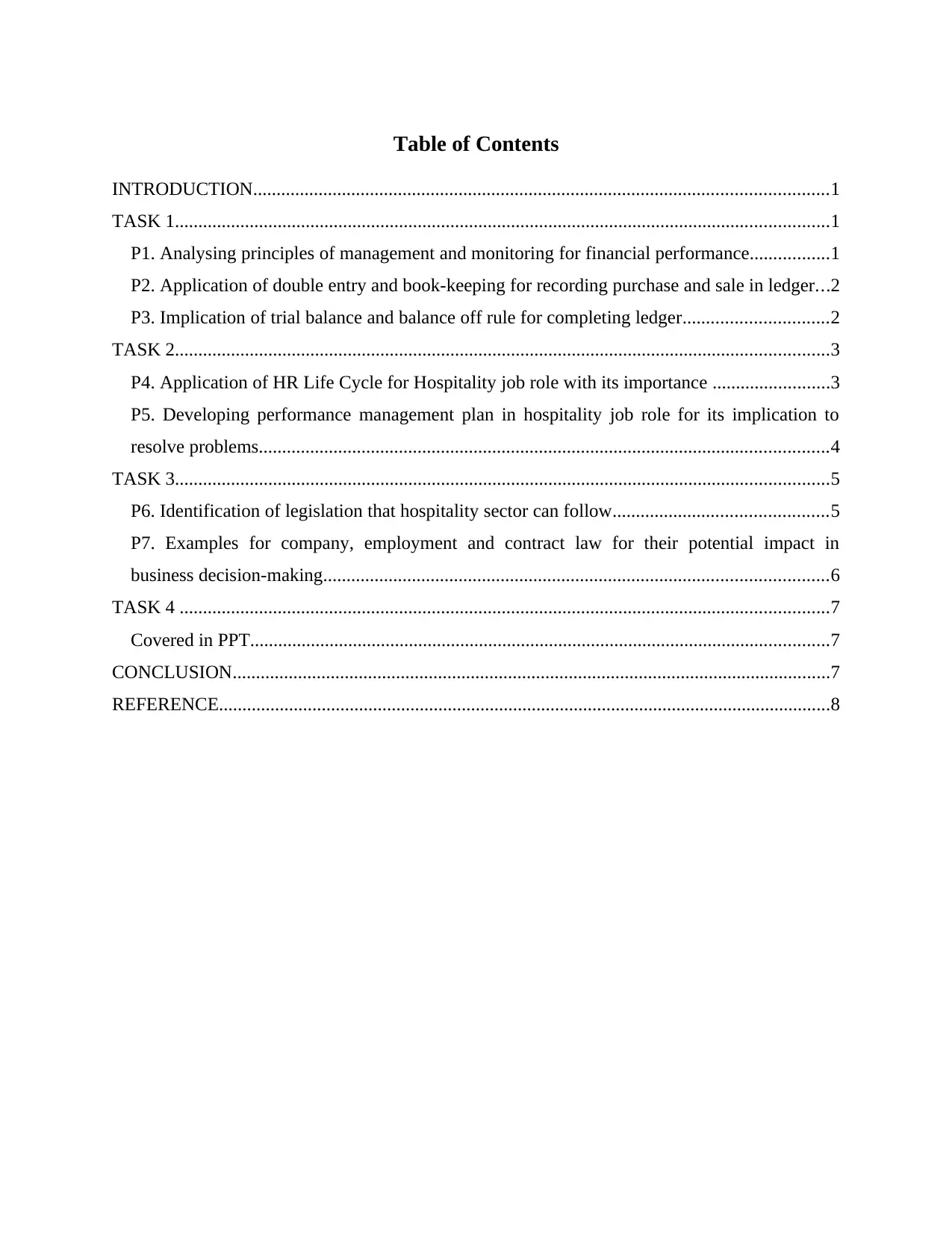
Table of Contents
INTRODUCTION...........................................................................................................................1
TASK 1............................................................................................................................................1
P1. Analysing principles of management and monitoring for financial performance.................1
P2. Application of double entry and book-keeping for recording purchase and sale in ledger...2
P3. Implication of trial balance and balance off rule for completing ledger...............................2
TASK 2............................................................................................................................................3
P4. Application of HR Life Cycle for Hospitality job role with its importance .........................3
P5. Developing performance management plan in hospitality job role for its implication to
resolve problems..........................................................................................................................4
TASK 3............................................................................................................................................5
P6. Identification of legislation that hospitality sector can follow..............................................5
P7. Examples for company, employment and contract law for their potential impact in
business decision-making............................................................................................................6
TASK 4 ...........................................................................................................................................7
Covered in PPT............................................................................................................................7
CONCLUSION................................................................................................................................7
REFERENCE...................................................................................................................................8
INTRODUCTION...........................................................................................................................1
TASK 1............................................................................................................................................1
P1. Analysing principles of management and monitoring for financial performance.................1
P2. Application of double entry and book-keeping for recording purchase and sale in ledger...2
P3. Implication of trial balance and balance off rule for completing ledger...............................2
TASK 2............................................................................................................................................3
P4. Application of HR Life Cycle for Hospitality job role with its importance .........................3
P5. Developing performance management plan in hospitality job role for its implication to
resolve problems..........................................................................................................................4
TASK 3............................................................................................................................................5
P6. Identification of legislation that hospitality sector can follow..............................................5
P7. Examples for company, employment and contract law for their potential impact in
business decision-making............................................................................................................6
TASK 4 ...........................................................................................................................................7
Covered in PPT............................................................................................................................7
CONCLUSION................................................................................................................................7
REFERENCE...................................................................................................................................8
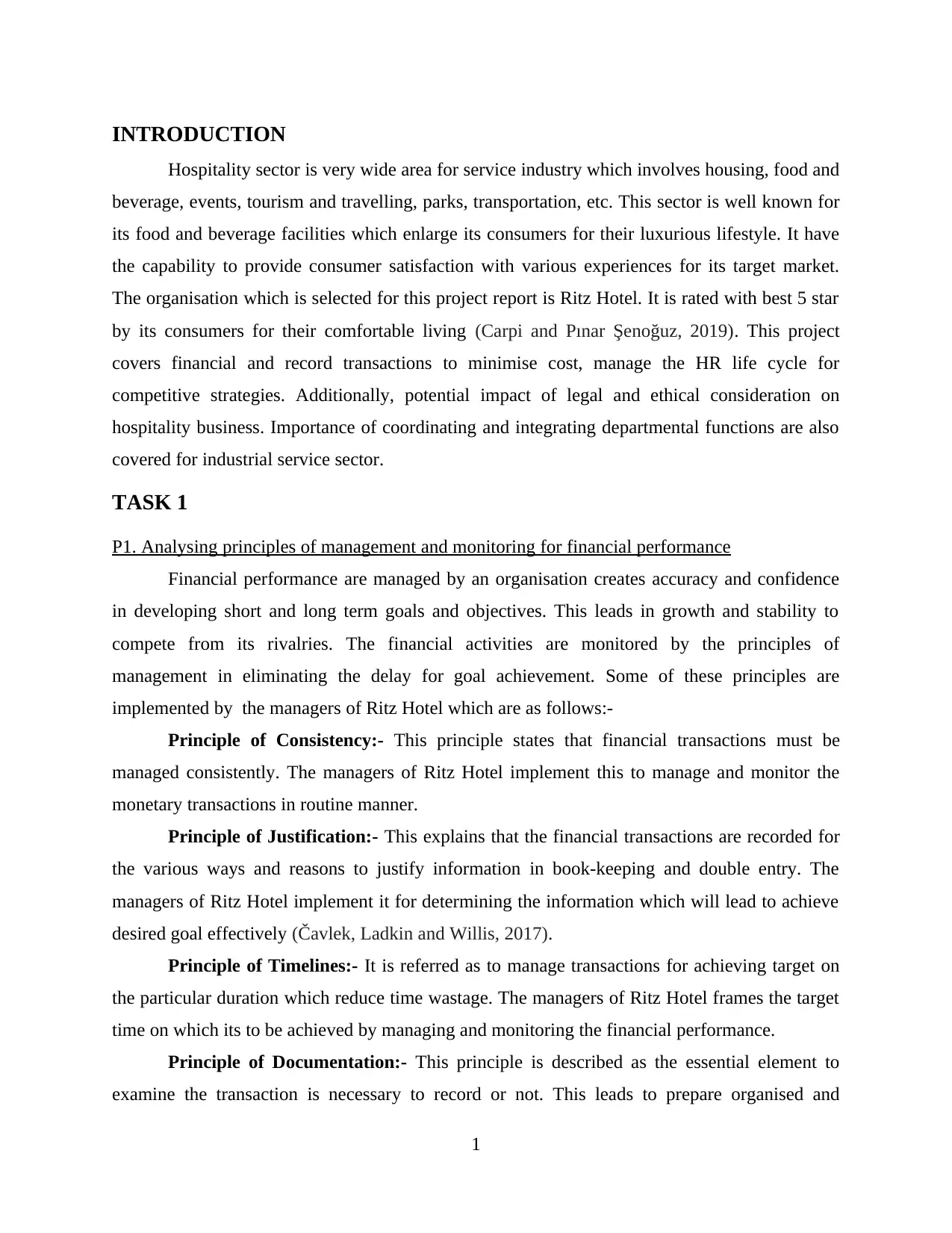
INTRODUCTION
Hospitality sector is very wide area for service industry which involves housing, food and
beverage, events, tourism and travelling, parks, transportation, etc. This sector is well known for
its food and beverage facilities which enlarge its consumers for their luxurious lifestyle. It have
the capability to provide consumer satisfaction with various experiences for its target market.
The organisation which is selected for this project report is Ritz Hotel. It is rated with best 5 star
by its consumers for their comfortable living (Carpi and Pınar Şenoğuz, 2019). This project
covers financial and record transactions to minimise cost, manage the HR life cycle for
competitive strategies. Additionally, potential impact of legal and ethical consideration on
hospitality business. Importance of coordinating and integrating departmental functions are also
covered for industrial service sector.
TASK 1
P1. Analysing principles of management and monitoring for financial performance
Financial performance are managed by an organisation creates accuracy and confidence
in developing short and long term goals and objectives. This leads in growth and stability to
compete from its rivalries. The financial activities are monitored by the principles of
management in eliminating the delay for goal achievement. Some of these principles are
implemented by the managers of Ritz Hotel which are as follows:-
Principle of Consistency:- This principle states that financial transactions must be
managed consistently. The managers of Ritz Hotel implement this to manage and monitor the
monetary transactions in routine manner.
Principle of Justification:- This explains that the financial transactions are recorded for
the various ways and reasons to justify information in book-keeping and double entry. The
managers of Ritz Hotel implement it for determining the information which will lead to achieve
desired goal effectively (Čavlek, Ladkin and Willis, 2017).
Principle of Timelines:- It is referred as to manage transactions for achieving target on
the particular duration which reduce time wastage. The managers of Ritz Hotel frames the target
time on which its to be achieved by managing and monitoring the financial performance.
Principle of Documentation:- This principle is described as the essential element to
examine the transaction is necessary to record or not. This leads to prepare organised and
1
Hospitality sector is very wide area for service industry which involves housing, food and
beverage, events, tourism and travelling, parks, transportation, etc. This sector is well known for
its food and beverage facilities which enlarge its consumers for their luxurious lifestyle. It have
the capability to provide consumer satisfaction with various experiences for its target market.
The organisation which is selected for this project report is Ritz Hotel. It is rated with best 5 star
by its consumers for their comfortable living (Carpi and Pınar Şenoğuz, 2019). This project
covers financial and record transactions to minimise cost, manage the HR life cycle for
competitive strategies. Additionally, potential impact of legal and ethical consideration on
hospitality business. Importance of coordinating and integrating departmental functions are also
covered for industrial service sector.
TASK 1
P1. Analysing principles of management and monitoring for financial performance
Financial performance are managed by an organisation creates accuracy and confidence
in developing short and long term goals and objectives. This leads in growth and stability to
compete from its rivalries. The financial activities are monitored by the principles of
management in eliminating the delay for goal achievement. Some of these principles are
implemented by the managers of Ritz Hotel which are as follows:-
Principle of Consistency:- This principle states that financial transactions must be
managed consistently. The managers of Ritz Hotel implement this to manage and monitor the
monetary transactions in routine manner.
Principle of Justification:- This explains that the financial transactions are recorded for
the various ways and reasons to justify information in book-keeping and double entry. The
managers of Ritz Hotel implement it for determining the information which will lead to achieve
desired goal effectively (Čavlek, Ladkin and Willis, 2017).
Principle of Timelines:- It is referred as to manage transactions for achieving target on
the particular duration which reduce time wastage. The managers of Ritz Hotel frames the target
time on which its to be achieved by managing and monitoring the financial performance.
Principle of Documentation:- This principle is described as the essential element to
examine the transaction is necessary to record or not. This leads to prepare organised and
1
⊘ This is a preview!⊘
Do you want full access?
Subscribe today to unlock all pages.

Trusted by 1+ million students worldwide
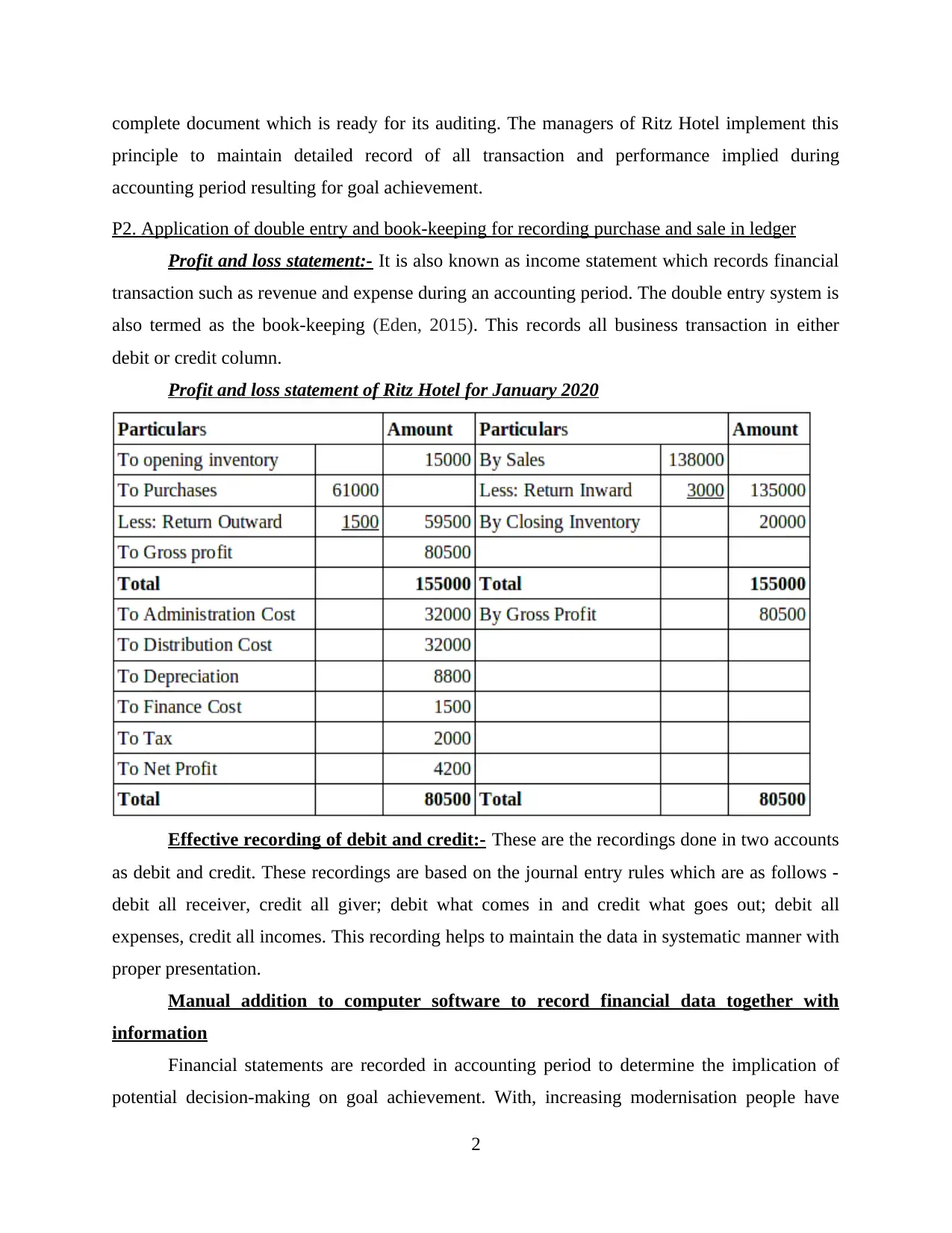
complete document which is ready for its auditing. The managers of Ritz Hotel implement this
principle to maintain detailed record of all transaction and performance implied during
accounting period resulting for goal achievement.
P2. Application of double entry and book-keeping for recording purchase and sale in ledger
Profit and loss statement:- It is also known as income statement which records financial
transaction such as revenue and expense during an accounting period. The double entry system is
also termed as the book-keeping (Eden, 2015). This records all business transaction in either
debit or credit column.
Profit and loss statement of Ritz Hotel for January 2020
Effective recording of debit and credit:- These are the recordings done in two accounts
as debit and credit. These recordings are based on the journal entry rules which are as follows -
debit all receiver, credit all giver; debit what comes in and credit what goes out; debit all
expenses, credit all incomes. This recording helps to maintain the data in systematic manner with
proper presentation.
Manual addition to computer software to record financial data together with
information
Financial statements are recorded in accounting period to determine the implication of
potential decision-making on goal achievement. With, increasing modernisation people have
2
principle to maintain detailed record of all transaction and performance implied during
accounting period resulting for goal achievement.
P2. Application of double entry and book-keeping for recording purchase and sale in ledger
Profit and loss statement:- It is also known as income statement which records financial
transaction such as revenue and expense during an accounting period. The double entry system is
also termed as the book-keeping (Eden, 2015). This records all business transaction in either
debit or credit column.
Profit and loss statement of Ritz Hotel for January 2020
Effective recording of debit and credit:- These are the recordings done in two accounts
as debit and credit. These recordings are based on the journal entry rules which are as follows -
debit all receiver, credit all giver; debit what comes in and credit what goes out; debit all
expenses, credit all incomes. This recording helps to maintain the data in systematic manner with
proper presentation.
Manual addition to computer software to record financial data together with
information
Financial statements are recorded in accounting period to determine the implication of
potential decision-making on goal achievement. With, increasing modernisation people have
2
Paraphrase This Document
Need a fresh take? Get an instant paraphrase of this document with our AI Paraphraser
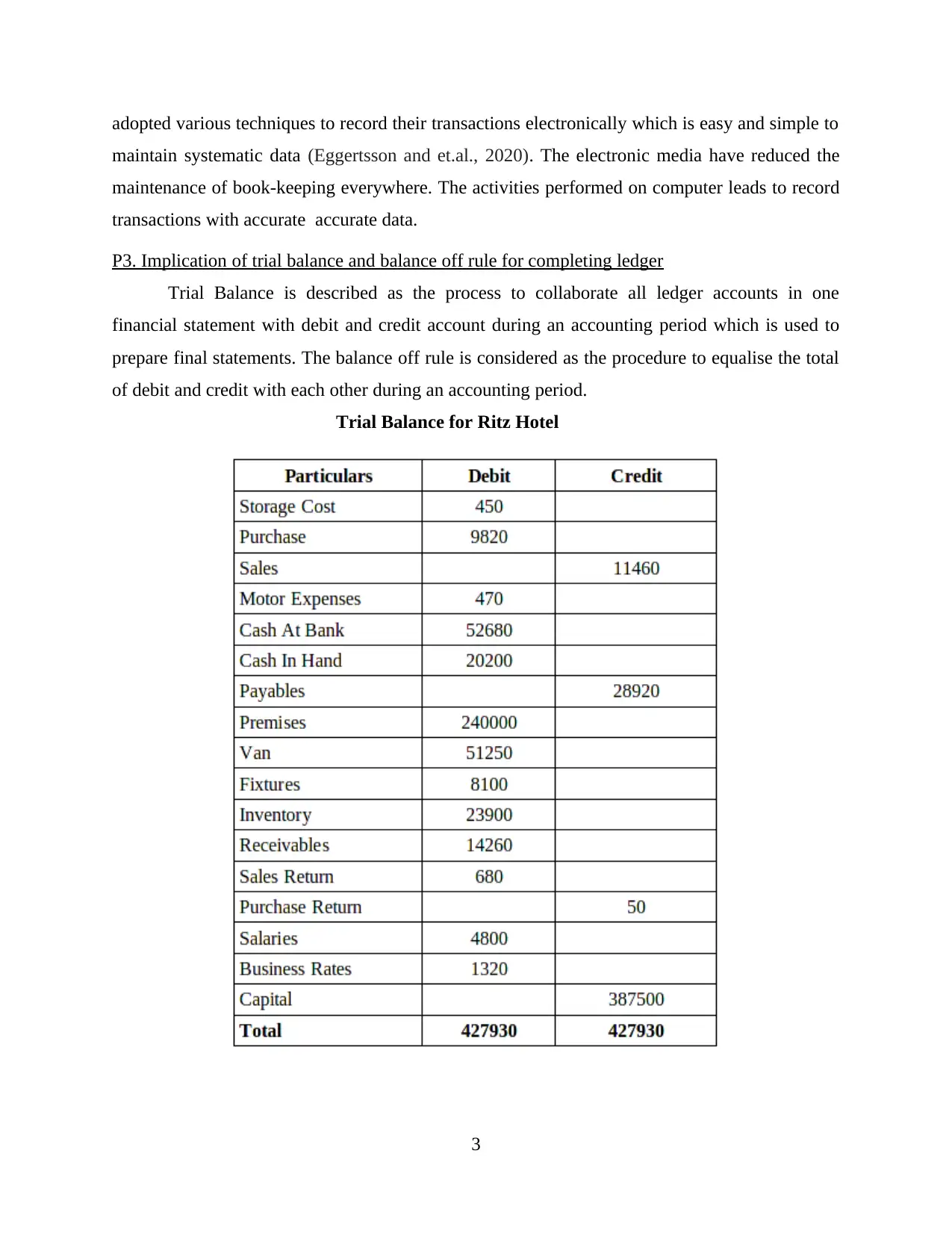
adopted various techniques to record their transactions electronically which is easy and simple to
maintain systematic data (Eggertsson and et.al., 2020). The electronic media have reduced the
maintenance of book-keeping everywhere. The activities performed on computer leads to record
transactions with accurate accurate data.
P3. Implication of trial balance and balance off rule for completing ledger
Trial Balance is described as the process to collaborate all ledger accounts in one
financial statement with debit and credit account during an accounting period which is used to
prepare final statements. The balance off rule is considered as the procedure to equalise the total
of debit and credit with each other during an accounting period.
Trial Balance for Ritz Hotel
3
maintain systematic data (Eggertsson and et.al., 2020). The electronic media have reduced the
maintenance of book-keeping everywhere. The activities performed on computer leads to record
transactions with accurate accurate data.
P3. Implication of trial balance and balance off rule for completing ledger
Trial Balance is described as the process to collaborate all ledger accounts in one
financial statement with debit and credit account during an accounting period which is used to
prepare final statements. The balance off rule is considered as the procedure to equalise the total
of debit and credit with each other during an accounting period.
Trial Balance for Ritz Hotel
3
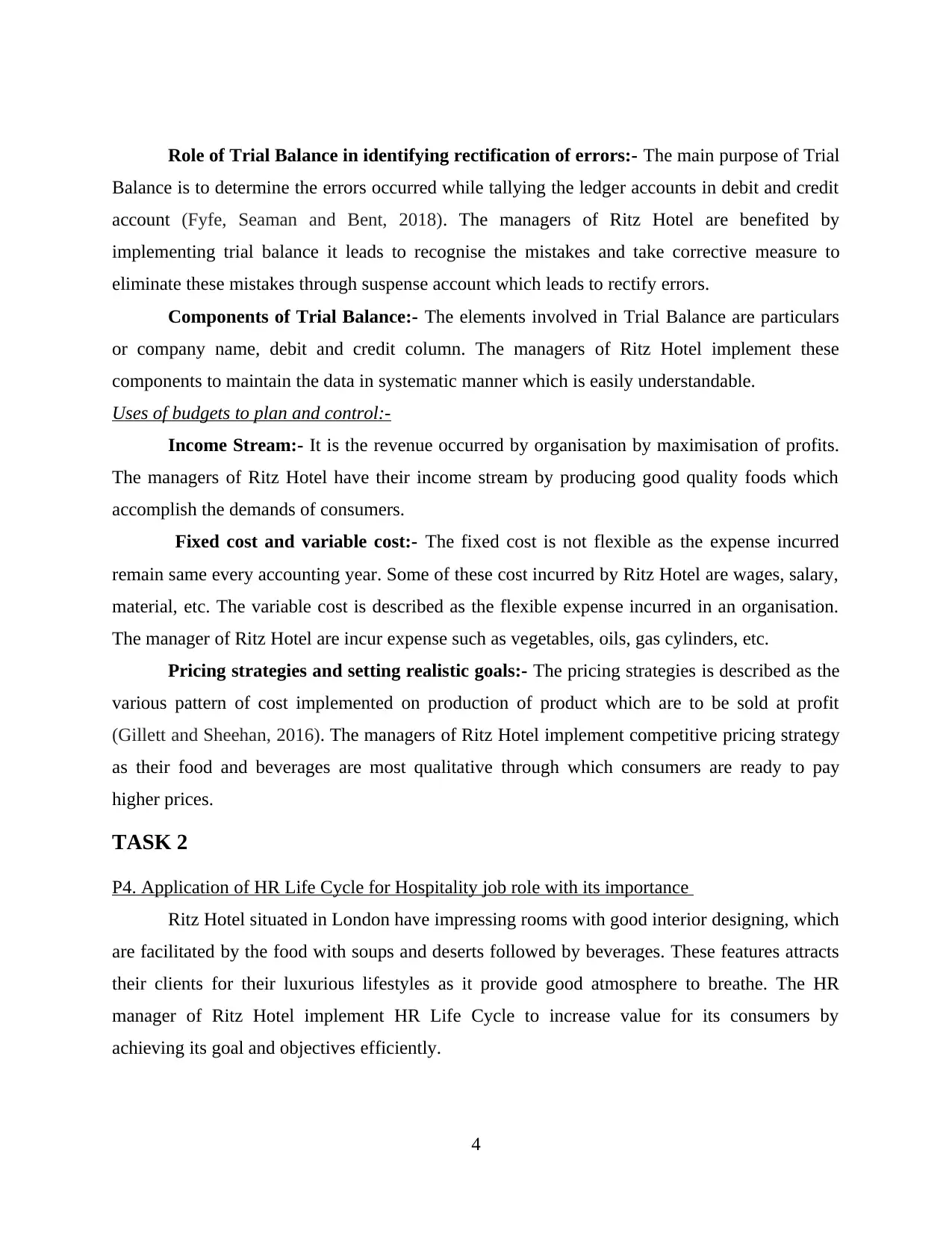
Role of Trial Balance in identifying rectification of errors:- The main purpose of Trial
Balance is to determine the errors occurred while tallying the ledger accounts in debit and credit
account (Fyfe, Seaman and Bent, 2018). The managers of Ritz Hotel are benefited by
implementing trial balance it leads to recognise the mistakes and take corrective measure to
eliminate these mistakes through suspense account which leads to rectify errors.
Components of Trial Balance:- The elements involved in Trial Balance are particulars
or company name, debit and credit column. The managers of Ritz Hotel implement these
components to maintain the data in systematic manner which is easily understandable.
Uses of budgets to plan and control:-
Income Stream:- It is the revenue occurred by organisation by maximisation of profits.
The managers of Ritz Hotel have their income stream by producing good quality foods which
accomplish the demands of consumers.
Fixed cost and variable cost:- The fixed cost is not flexible as the expense incurred
remain same every accounting year. Some of these cost incurred by Ritz Hotel are wages, salary,
material, etc. The variable cost is described as the flexible expense incurred in an organisation.
The manager of Ritz Hotel are incur expense such as vegetables, oils, gas cylinders, etc.
Pricing strategies and setting realistic goals:- The pricing strategies is described as the
various pattern of cost implemented on production of product which are to be sold at profit
(Gillett and Sheehan, 2016). The managers of Ritz Hotel implement competitive pricing strategy
as their food and beverages are most qualitative through which consumers are ready to pay
higher prices.
TASK 2
P4. Application of HR Life Cycle for Hospitality job role with its importance
Ritz Hotel situated in London have impressing rooms with good interior designing, which
are facilitated by the food with soups and deserts followed by beverages. These features attracts
their clients for their luxurious lifestyles as it provide good atmosphere to breathe. The HR
manager of Ritz Hotel implement HR Life Cycle to increase value for its consumers by
achieving its goal and objectives efficiently.
4
Balance is to determine the errors occurred while tallying the ledger accounts in debit and credit
account (Fyfe, Seaman and Bent, 2018). The managers of Ritz Hotel are benefited by
implementing trial balance it leads to recognise the mistakes and take corrective measure to
eliminate these mistakes through suspense account which leads to rectify errors.
Components of Trial Balance:- The elements involved in Trial Balance are particulars
or company name, debit and credit column. The managers of Ritz Hotel implement these
components to maintain the data in systematic manner which is easily understandable.
Uses of budgets to plan and control:-
Income Stream:- It is the revenue occurred by organisation by maximisation of profits.
The managers of Ritz Hotel have their income stream by producing good quality foods which
accomplish the demands of consumers.
Fixed cost and variable cost:- The fixed cost is not flexible as the expense incurred
remain same every accounting year. Some of these cost incurred by Ritz Hotel are wages, salary,
material, etc. The variable cost is described as the flexible expense incurred in an organisation.
The manager of Ritz Hotel are incur expense such as vegetables, oils, gas cylinders, etc.
Pricing strategies and setting realistic goals:- The pricing strategies is described as the
various pattern of cost implemented on production of product which are to be sold at profit
(Gillett and Sheehan, 2016). The managers of Ritz Hotel implement competitive pricing strategy
as their food and beverages are most qualitative through which consumers are ready to pay
higher prices.
TASK 2
P4. Application of HR Life Cycle for Hospitality job role with its importance
Ritz Hotel situated in London have impressing rooms with good interior designing, which
are facilitated by the food with soups and deserts followed by beverages. These features attracts
their clients for their luxurious lifestyles as it provide good atmosphere to breathe. The HR
manager of Ritz Hotel implement HR Life Cycle to increase value for its consumers by
achieving its goal and objectives efficiently.
4
⊘ This is a preview!⊘
Do you want full access?
Subscribe today to unlock all pages.

Trusted by 1+ million students worldwide
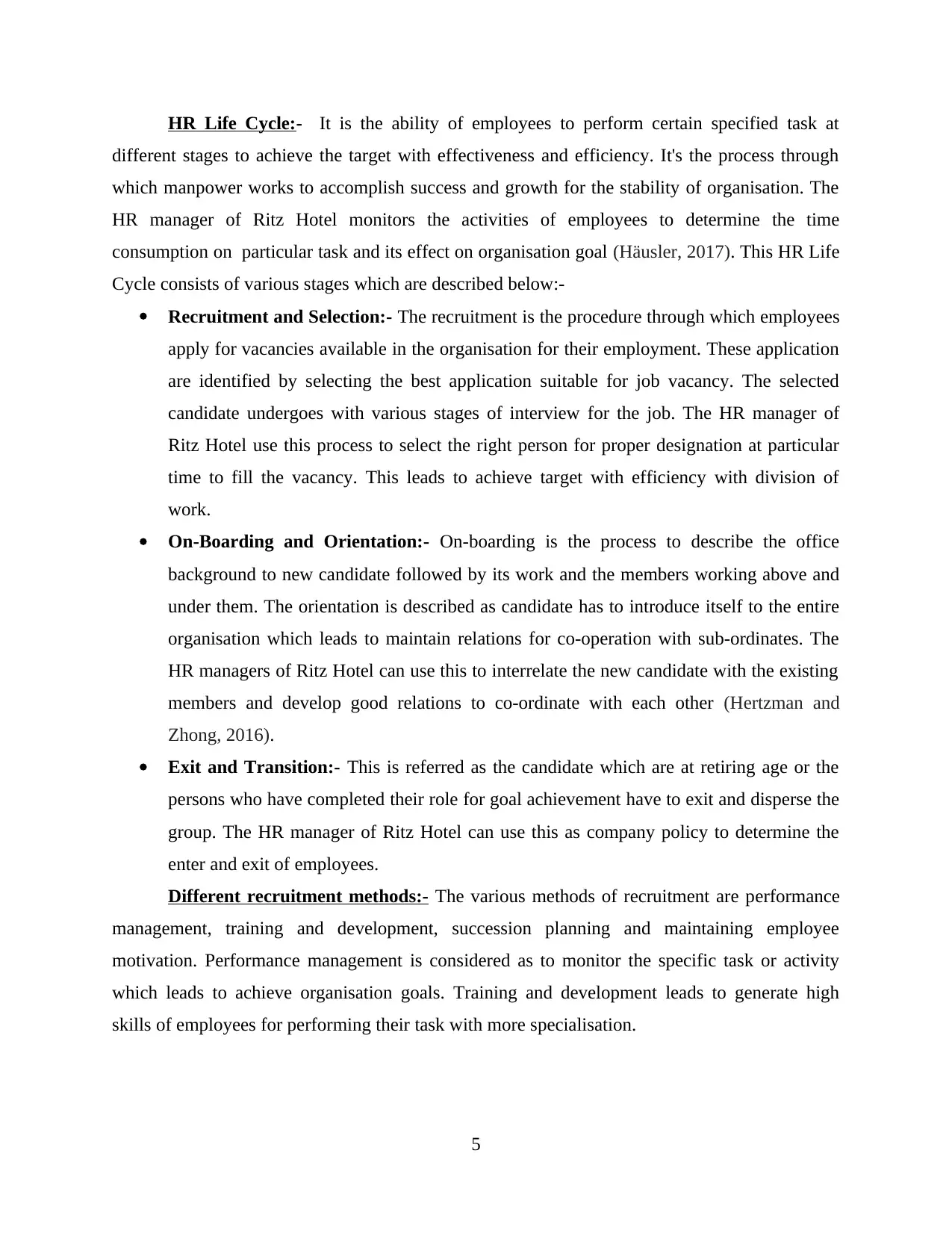
HR Life Cycle:- It is the ability of employees to perform certain specified task at
different stages to achieve the target with effectiveness and efficiency. It's the process through
which manpower works to accomplish success and growth for the stability of organisation. The
HR manager of Ritz Hotel monitors the activities of employees to determine the time
consumption on particular task and its effect on organisation goal (Häusler, 2017). This HR Life
Cycle consists of various stages which are described below:-
Recruitment and Selection:- The recruitment is the procedure through which employees
apply for vacancies available in the organisation for their employment. These application
are identified by selecting the best application suitable for job vacancy. The selected
candidate undergoes with various stages of interview for the job. The HR manager of
Ritz Hotel use this process to select the right person for proper designation at particular
time to fill the vacancy. This leads to achieve target with efficiency with division of
work.
On-Boarding and Orientation:- On-boarding is the process to describe the office
background to new candidate followed by its work and the members working above and
under them. The orientation is described as candidate has to introduce itself to the entire
organisation which leads to maintain relations for co-operation with sub-ordinates. The
HR managers of Ritz Hotel can use this to interrelate the new candidate with the existing
members and develop good relations to co-ordinate with each other (Hertzman and
Zhong, 2016).
Exit and Transition:- This is referred as the candidate which are at retiring age or the
persons who have completed their role for goal achievement have to exit and disperse the
group. The HR manager of Ritz Hotel can use this as company policy to determine the
enter and exit of employees.
Different recruitment methods:- The various methods of recruitment are performance
management, training and development, succession planning and maintaining employee
motivation. Performance management is considered as to monitor the specific task or activity
which leads to achieve organisation goals. Training and development leads to generate high
skills of employees for performing their task with more specialisation.
5
different stages to achieve the target with effectiveness and efficiency. It's the process through
which manpower works to accomplish success and growth for the stability of organisation. The
HR manager of Ritz Hotel monitors the activities of employees to determine the time
consumption on particular task and its effect on organisation goal (Häusler, 2017). This HR Life
Cycle consists of various stages which are described below:-
Recruitment and Selection:- The recruitment is the procedure through which employees
apply for vacancies available in the organisation for their employment. These application
are identified by selecting the best application suitable for job vacancy. The selected
candidate undergoes with various stages of interview for the job. The HR manager of
Ritz Hotel use this process to select the right person for proper designation at particular
time to fill the vacancy. This leads to achieve target with efficiency with division of
work.
On-Boarding and Orientation:- On-boarding is the process to describe the office
background to new candidate followed by its work and the members working above and
under them. The orientation is described as candidate has to introduce itself to the entire
organisation which leads to maintain relations for co-operation with sub-ordinates. The
HR managers of Ritz Hotel can use this to interrelate the new candidate with the existing
members and develop good relations to co-ordinate with each other (Hertzman and
Zhong, 2016).
Exit and Transition:- This is referred as the candidate which are at retiring age or the
persons who have completed their role for goal achievement have to exit and disperse the
group. The HR manager of Ritz Hotel can use this as company policy to determine the
enter and exit of employees.
Different recruitment methods:- The various methods of recruitment are performance
management, training and development, succession planning and maintaining employee
motivation. Performance management is considered as to monitor the specific task or activity
which leads to achieve organisation goals. Training and development leads to generate high
skills of employees for performing their task with more specialisation.
5
Paraphrase This Document
Need a fresh take? Get an instant paraphrase of this document with our AI Paraphraser
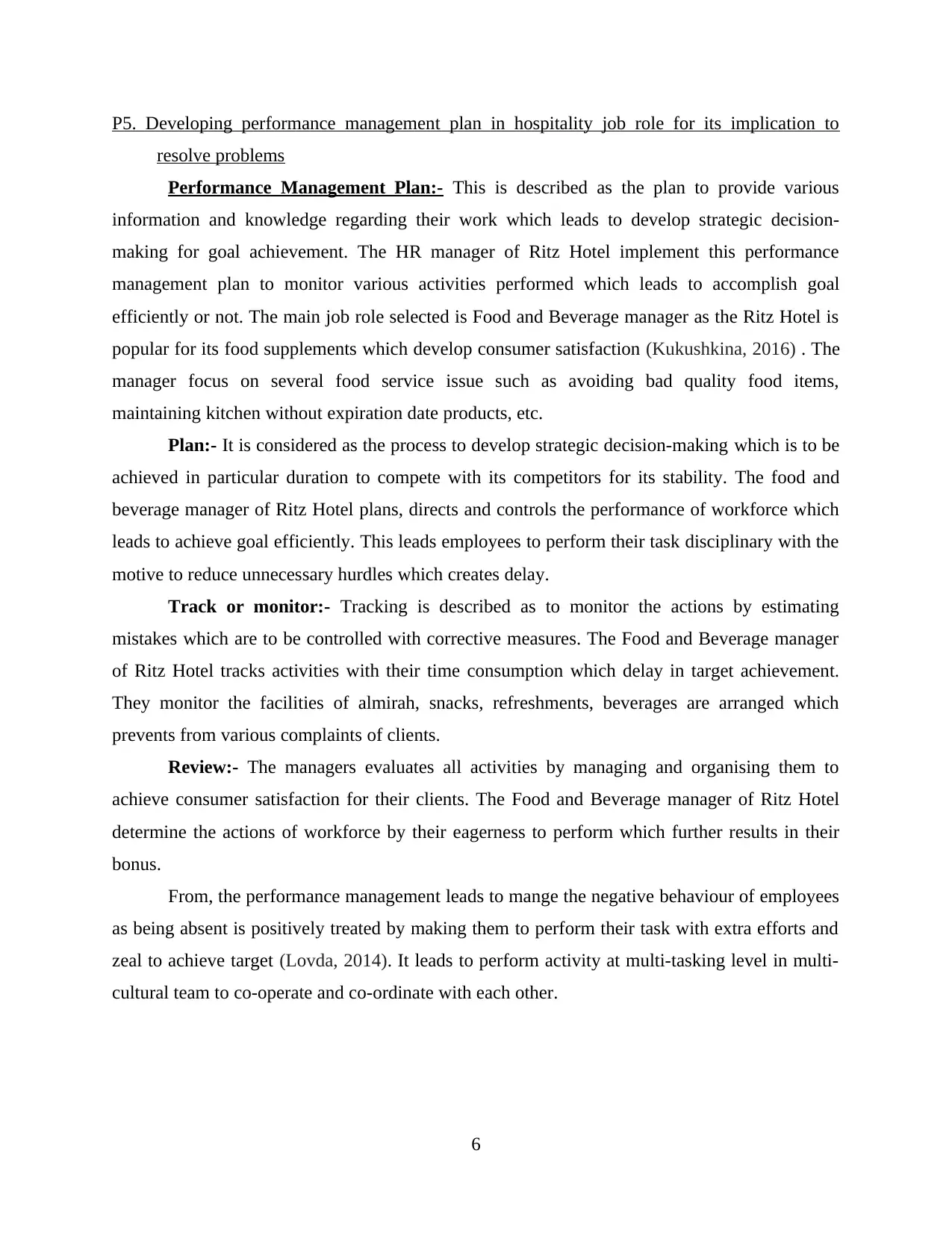
P5. Developing performance management plan in hospitality job role for its implication to
resolve problems
Performance Management Plan:- This is described as the plan to provide various
information and knowledge regarding their work which leads to develop strategic decision-
making for goal achievement. The HR manager of Ritz Hotel implement this performance
management plan to monitor various activities performed which leads to accomplish goal
efficiently or not. The main job role selected is Food and Beverage manager as the Ritz Hotel is
popular for its food supplements which develop consumer satisfaction (Kukushkina, 2016) . The
manager focus on several food service issue such as avoiding bad quality food items,
maintaining kitchen without expiration date products, etc.
Plan:- It is considered as the process to develop strategic decision-making which is to be
achieved in particular duration to compete with its competitors for its stability. The food and
beverage manager of Ritz Hotel plans, directs and controls the performance of workforce which
leads to achieve goal efficiently. This leads employees to perform their task disciplinary with the
motive to reduce unnecessary hurdles which creates delay.
Track or monitor:- Tracking is described as to monitor the actions by estimating
mistakes which are to be controlled with corrective measures. The Food and Beverage manager
of Ritz Hotel tracks activities with their time consumption which delay in target achievement.
They monitor the facilities of almirah, snacks, refreshments, beverages are arranged which
prevents from various complaints of clients.
Review:- The managers evaluates all activities by managing and organising them to
achieve consumer satisfaction for their clients. The Food and Beverage manager of Ritz Hotel
determine the actions of workforce by their eagerness to perform which further results in their
bonus.
From, the performance management leads to mange the negative behaviour of employees
as being absent is positively treated by making them to perform their task with extra efforts and
zeal to achieve target (Lovda, 2014). It leads to perform activity at multi-tasking level in multi-
cultural team to co-operate and co-ordinate with each other.
6
resolve problems
Performance Management Plan:- This is described as the plan to provide various
information and knowledge regarding their work which leads to develop strategic decision-
making for goal achievement. The HR manager of Ritz Hotel implement this performance
management plan to monitor various activities performed which leads to accomplish goal
efficiently or not. The main job role selected is Food and Beverage manager as the Ritz Hotel is
popular for its food supplements which develop consumer satisfaction (Kukushkina, 2016) . The
manager focus on several food service issue such as avoiding bad quality food items,
maintaining kitchen without expiration date products, etc.
Plan:- It is considered as the process to develop strategic decision-making which is to be
achieved in particular duration to compete with its competitors for its stability. The food and
beverage manager of Ritz Hotel plans, directs and controls the performance of workforce which
leads to achieve goal efficiently. This leads employees to perform their task disciplinary with the
motive to reduce unnecessary hurdles which creates delay.
Track or monitor:- Tracking is described as to monitor the actions by estimating
mistakes which are to be controlled with corrective measures. The Food and Beverage manager
of Ritz Hotel tracks activities with their time consumption which delay in target achievement.
They monitor the facilities of almirah, snacks, refreshments, beverages are arranged which
prevents from various complaints of clients.
Review:- The managers evaluates all activities by managing and organising them to
achieve consumer satisfaction for their clients. The Food and Beverage manager of Ritz Hotel
determine the actions of workforce by their eagerness to perform which further results in their
bonus.
From, the performance management leads to mange the negative behaviour of employees
as being absent is positively treated by making them to perform their task with extra efforts and
zeal to achieve target (Lovda, 2014). It leads to perform activity at multi-tasking level in multi-
cultural team to co-operate and co-ordinate with each other.
6
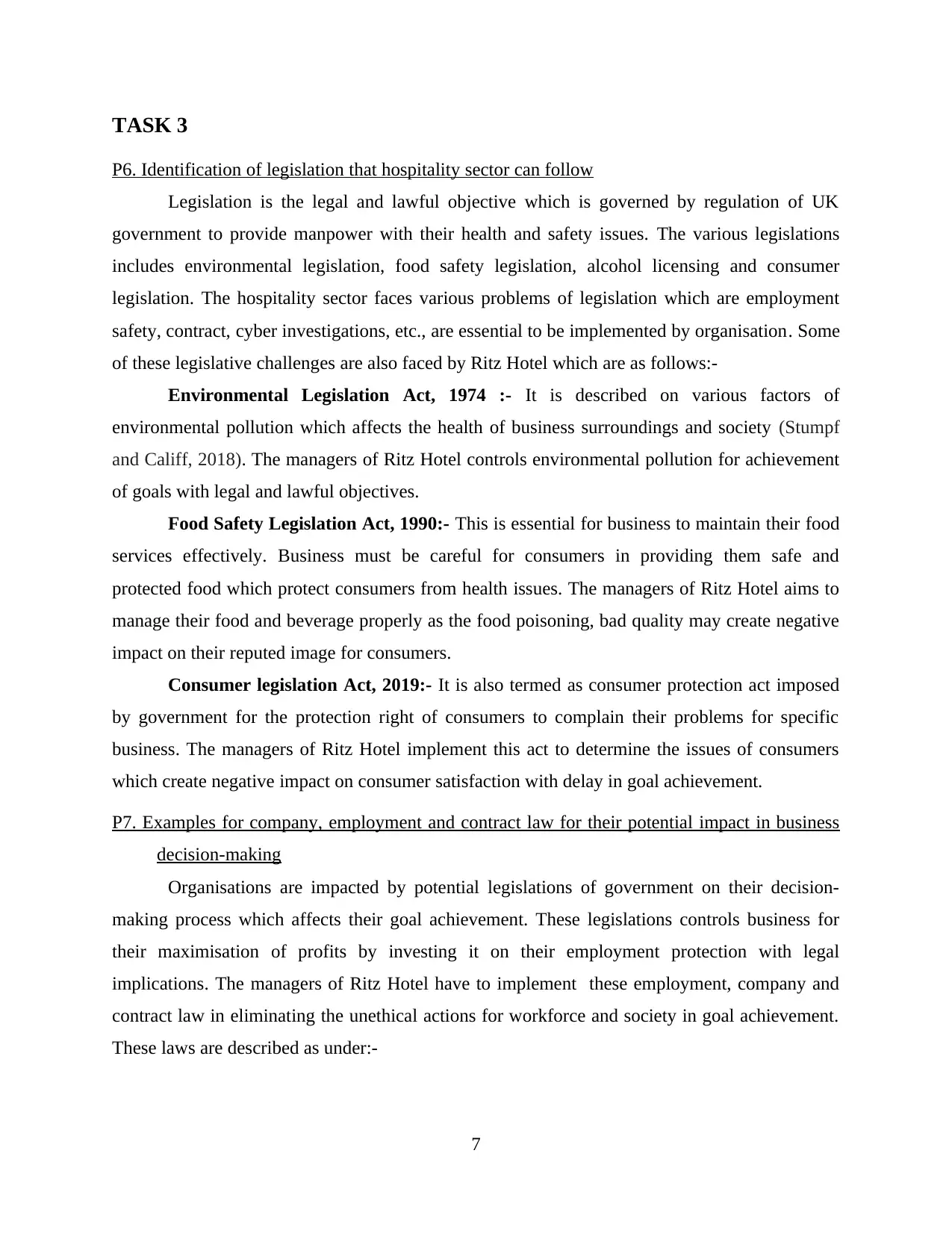
TASK 3
P6. Identification of legislation that hospitality sector can follow
Legislation is the legal and lawful objective which is governed by regulation of UK
government to provide manpower with their health and safety issues. The various legislations
includes environmental legislation, food safety legislation, alcohol licensing and consumer
legislation. The hospitality sector faces various problems of legislation which are employment
safety, contract, cyber investigations, etc., are essential to be implemented by organisation. Some
of these legislative challenges are also faced by Ritz Hotel which are as follows:-
Environmental Legislation Act, 1974 :- It is described on various factors of
environmental pollution which affects the health of business surroundings and society (Stumpf
and Califf, 2018). The managers of Ritz Hotel controls environmental pollution for achievement
of goals with legal and lawful objectives.
Food Safety Legislation Act, 1990:- This is essential for business to maintain their food
services effectively. Business must be careful for consumers in providing them safe and
protected food which protect consumers from health issues. The managers of Ritz Hotel aims to
manage their food and beverage properly as the food poisoning, bad quality may create negative
impact on their reputed image for consumers.
Consumer legislation Act, 2019:- It is also termed as consumer protection act imposed
by government for the protection right of consumers to complain their problems for specific
business. The managers of Ritz Hotel implement this act to determine the issues of consumers
which create negative impact on consumer satisfaction with delay in goal achievement.
P7. Examples for company, employment and contract law for their potential impact in business
decision-making
Organisations are impacted by potential legislations of government on their decision-
making process which affects their goal achievement. These legislations controls business for
their maximisation of profits by investing it on their employment protection with legal
implications. The managers of Ritz Hotel have to implement these employment, company and
contract law in eliminating the unethical actions for workforce and society in goal achievement.
These laws are described as under:-
7
P6. Identification of legislation that hospitality sector can follow
Legislation is the legal and lawful objective which is governed by regulation of UK
government to provide manpower with their health and safety issues. The various legislations
includes environmental legislation, food safety legislation, alcohol licensing and consumer
legislation. The hospitality sector faces various problems of legislation which are employment
safety, contract, cyber investigations, etc., are essential to be implemented by organisation. Some
of these legislative challenges are also faced by Ritz Hotel which are as follows:-
Environmental Legislation Act, 1974 :- It is described on various factors of
environmental pollution which affects the health of business surroundings and society (Stumpf
and Califf, 2018). The managers of Ritz Hotel controls environmental pollution for achievement
of goals with legal and lawful objectives.
Food Safety Legislation Act, 1990:- This is essential for business to maintain their food
services effectively. Business must be careful for consumers in providing them safe and
protected food which protect consumers from health issues. The managers of Ritz Hotel aims to
manage their food and beverage properly as the food poisoning, bad quality may create negative
impact on their reputed image for consumers.
Consumer legislation Act, 2019:- It is also termed as consumer protection act imposed
by government for the protection right of consumers to complain their problems for specific
business. The managers of Ritz Hotel implement this act to determine the issues of consumers
which create negative impact on consumer satisfaction with delay in goal achievement.
P7. Examples for company, employment and contract law for their potential impact in business
decision-making
Organisations are impacted by potential legislations of government on their decision-
making process which affects their goal achievement. These legislations controls business for
their maximisation of profits by investing it on their employment protection with legal
implications. The managers of Ritz Hotel have to implement these employment, company and
contract law in eliminating the unethical actions for workforce and society in goal achievement.
These laws are described as under:-
7
⊘ This is a preview!⊘
Do you want full access?
Subscribe today to unlock all pages.

Trusted by 1+ million students worldwide
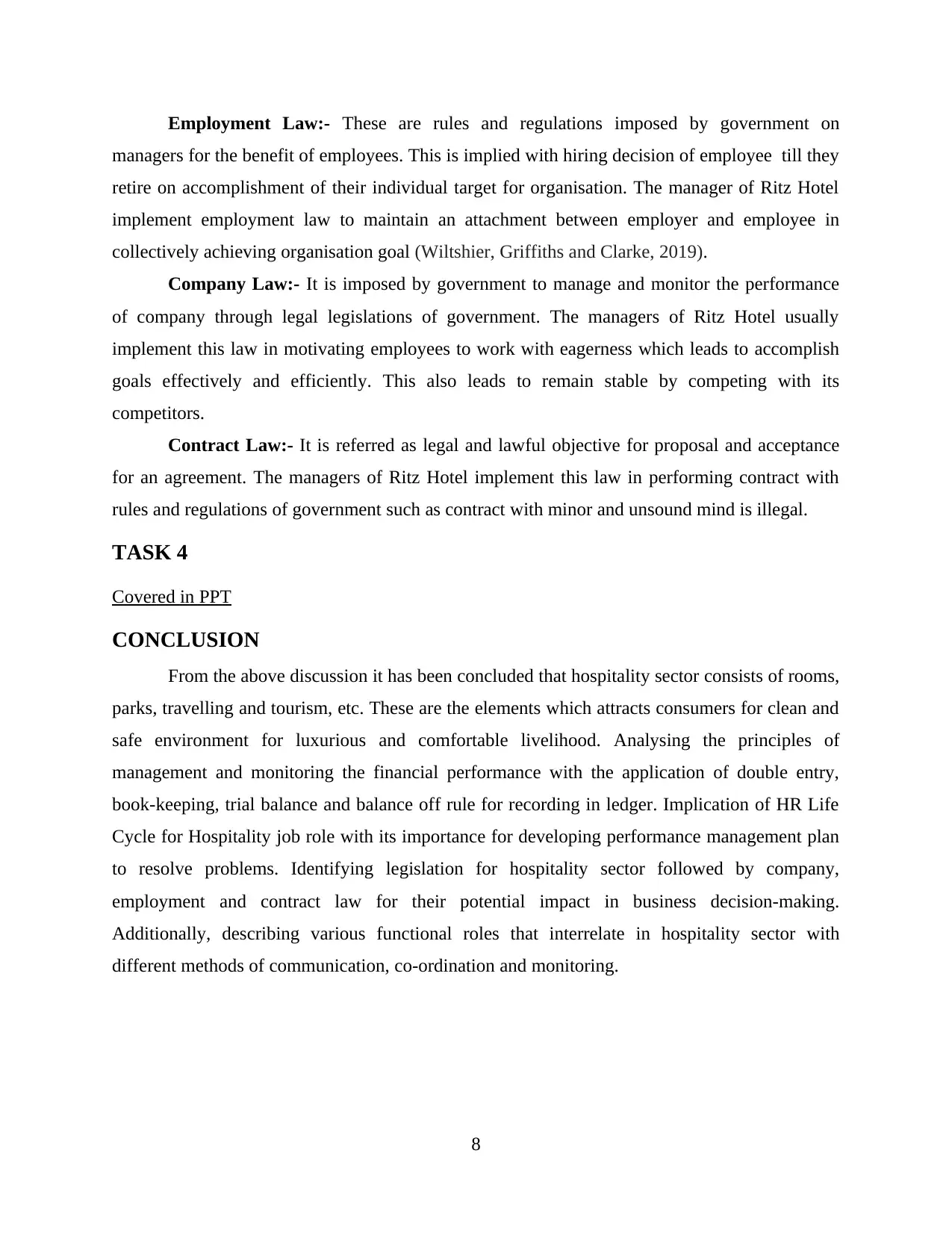
Employment Law:- These are rules and regulations imposed by government on
managers for the benefit of employees. This is implied with hiring decision of employee till they
retire on accomplishment of their individual target for organisation. The manager of Ritz Hotel
implement employment law to maintain an attachment between employer and employee in
collectively achieving organisation goal (Wiltshier, Griffiths and Clarke, 2019).
Company Law:- It is imposed by government to manage and monitor the performance
of company through legal legislations of government. The managers of Ritz Hotel usually
implement this law in motivating employees to work with eagerness which leads to accomplish
goals effectively and efficiently. This also leads to remain stable by competing with its
competitors.
Contract Law:- It is referred as legal and lawful objective for proposal and acceptance
for an agreement. The managers of Ritz Hotel implement this law in performing contract with
rules and regulations of government such as contract with minor and unsound mind is illegal.
TASK 4
Covered in PPT
CONCLUSION
From the above discussion it has been concluded that hospitality sector consists of rooms,
parks, travelling and tourism, etc. These are the elements which attracts consumers for clean and
safe environment for luxurious and comfortable livelihood. Analysing the principles of
management and monitoring the financial performance with the application of double entry,
book-keeping, trial balance and balance off rule for recording in ledger. Implication of HR Life
Cycle for Hospitality job role with its importance for developing performance management plan
to resolve problems. Identifying legislation for hospitality sector followed by company,
employment and contract law for their potential impact in business decision-making.
Additionally, describing various functional roles that interrelate in hospitality sector with
different methods of communication, co-ordination and monitoring.
8
managers for the benefit of employees. This is implied with hiring decision of employee till they
retire on accomplishment of their individual target for organisation. The manager of Ritz Hotel
implement employment law to maintain an attachment between employer and employee in
collectively achieving organisation goal (Wiltshier, Griffiths and Clarke, 2019).
Company Law:- It is imposed by government to manage and monitor the performance
of company through legal legislations of government. The managers of Ritz Hotel usually
implement this law in motivating employees to work with eagerness which leads to accomplish
goals effectively and efficiently. This also leads to remain stable by competing with its
competitors.
Contract Law:- It is referred as legal and lawful objective for proposal and acceptance
for an agreement. The managers of Ritz Hotel implement this law in performing contract with
rules and regulations of government such as contract with minor and unsound mind is illegal.
TASK 4
Covered in PPT
CONCLUSION
From the above discussion it has been concluded that hospitality sector consists of rooms,
parks, travelling and tourism, etc. These are the elements which attracts consumers for clean and
safe environment for luxurious and comfortable livelihood. Analysing the principles of
management and monitoring the financial performance with the application of double entry,
book-keeping, trial balance and balance off rule for recording in ledger. Implication of HR Life
Cycle for Hospitality job role with its importance for developing performance management plan
to resolve problems. Identifying legislation for hospitality sector followed by company,
employment and contract law for their potential impact in business decision-making.
Additionally, describing various functional roles that interrelate in hospitality sector with
different methods of communication, co-ordination and monitoring.
8
Paraphrase This Document
Need a fresh take? Get an instant paraphrase of this document with our AI Paraphraser
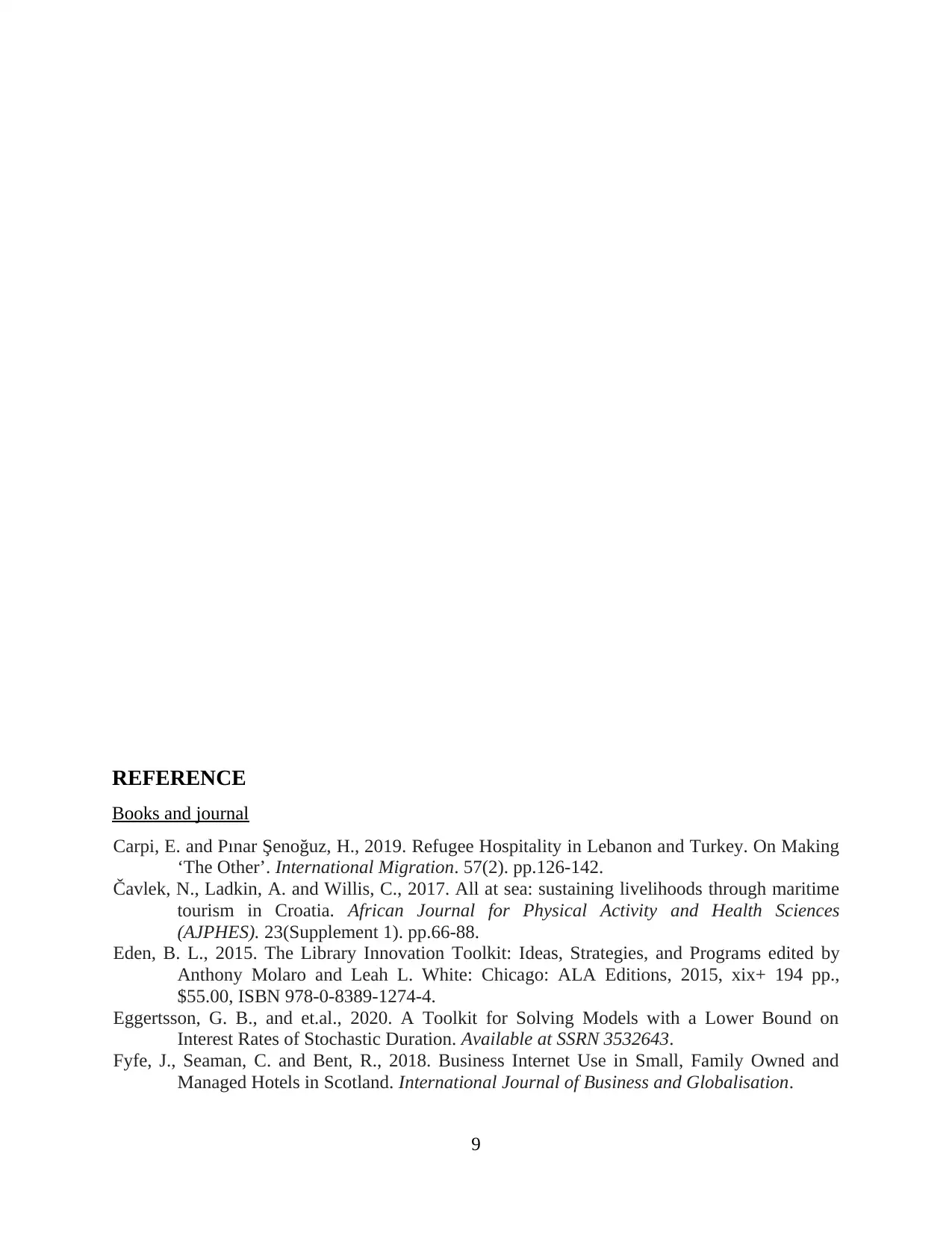
REFERENCE
Books and journal
Carpi, E. and Pınar Şenoğuz, H., 2019. Refugee Hospitality in Lebanon and Turkey. On Making
‘The Other’. International Migration. 57(2). pp.126-142.
Čavlek, N., Ladkin, A. and Willis, C., 2017. All at sea: sustaining livelihoods through maritime
tourism in Croatia. African Journal for Physical Activity and Health Sciences
(AJPHES). 23(Supplement 1). pp.66-88.
Eden, B. L., 2015. The Library Innovation Toolkit: Ideas, Strategies, and Programs edited by
Anthony Molaro and Leah L. White: Chicago: ALA Editions, 2015, xix+ 194 pp.,
$55.00, ISBN 978-0-8389-1274-4.
Eggertsson, G. B., and et.al., 2020. A Toolkit for Solving Models with a Lower Bound on
Interest Rates of Stochastic Duration. Available at SSRN 3532643.
Fyfe, J., Seaman, C. and Bent, R., 2018. Business Internet Use in Small, Family Owned and
Managed Hotels in Scotland. International Journal of Business and Globalisation.
9
Books and journal
Carpi, E. and Pınar Şenoğuz, H., 2019. Refugee Hospitality in Lebanon and Turkey. On Making
‘The Other’. International Migration. 57(2). pp.126-142.
Čavlek, N., Ladkin, A. and Willis, C., 2017. All at sea: sustaining livelihoods through maritime
tourism in Croatia. African Journal for Physical Activity and Health Sciences
(AJPHES). 23(Supplement 1). pp.66-88.
Eden, B. L., 2015. The Library Innovation Toolkit: Ideas, Strategies, and Programs edited by
Anthony Molaro and Leah L. White: Chicago: ALA Editions, 2015, xix+ 194 pp.,
$55.00, ISBN 978-0-8389-1274-4.
Eggertsson, G. B., and et.al., 2020. A Toolkit for Solving Models with a Lower Bound on
Interest Rates of Stochastic Duration. Available at SSRN 3532643.
Fyfe, J., Seaman, C. and Bent, R., 2018. Business Internet Use in Small, Family Owned and
Managed Hotels in Scotland. International Journal of Business and Globalisation.
9
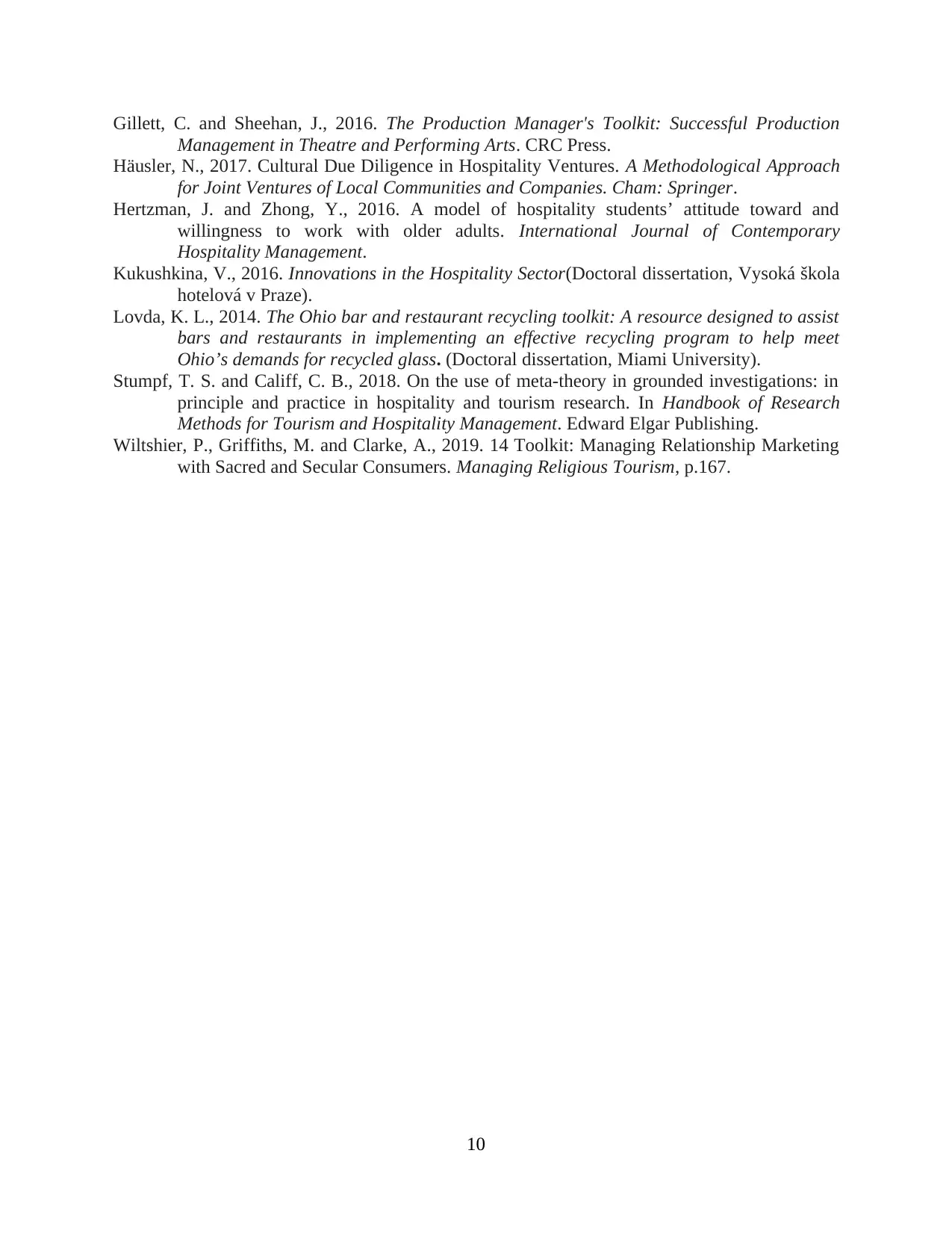
Gillett, C. and Sheehan, J., 2016. The Production Manager's Toolkit: Successful Production
Management in Theatre and Performing Arts. CRC Press.
Häusler, N., 2017. Cultural Due Diligence in Hospitality Ventures. A Methodological Approach
for Joint Ventures of Local Communities and Companies. Cham: Springer.
Hertzman, J. and Zhong, Y., 2016. A model of hospitality students’ attitude toward and
willingness to work with older adults. International Journal of Contemporary
Hospitality Management.
Kukushkina, V., 2016. Innovations in the Hospitality Sector(Doctoral dissertation, Vysoká škola
hotelová v Praze).
Lovda, K. L., 2014. The Ohio bar and restaurant recycling toolkit: A resource designed to assist
bars and restaurants in implementing an effective recycling program to help meet
Ohio’s demands for recycled glass. (Doctoral dissertation, Miami University).
Stumpf, T. S. and Califf, C. B., 2018. On the use of meta-theory in grounded investigations: in
principle and practice in hospitality and tourism research. In Handbook of Research
Methods for Tourism and Hospitality Management. Edward Elgar Publishing.
Wiltshier, P., Griffiths, M. and Clarke, A., 2019. 14 Toolkit: Managing Relationship Marketing
with Sacred and Secular Consumers. Managing Religious Tourism, p.167.
10
Management in Theatre and Performing Arts. CRC Press.
Häusler, N., 2017. Cultural Due Diligence in Hospitality Ventures. A Methodological Approach
for Joint Ventures of Local Communities and Companies. Cham: Springer.
Hertzman, J. and Zhong, Y., 2016. A model of hospitality students’ attitude toward and
willingness to work with older adults. International Journal of Contemporary
Hospitality Management.
Kukushkina, V., 2016. Innovations in the Hospitality Sector(Doctoral dissertation, Vysoká škola
hotelová v Praze).
Lovda, K. L., 2014. The Ohio bar and restaurant recycling toolkit: A resource designed to assist
bars and restaurants in implementing an effective recycling program to help meet
Ohio’s demands for recycled glass. (Doctoral dissertation, Miami University).
Stumpf, T. S. and Califf, C. B., 2018. On the use of meta-theory in grounded investigations: in
principle and practice in hospitality and tourism research. In Handbook of Research
Methods for Tourism and Hospitality Management. Edward Elgar Publishing.
Wiltshier, P., Griffiths, M. and Clarke, A., 2019. 14 Toolkit: Managing Relationship Marketing
with Sacred and Secular Consumers. Managing Religious Tourism, p.167.
10
⊘ This is a preview!⊘
Do you want full access?
Subscribe today to unlock all pages.

Trusted by 1+ million students worldwide
1 out of 12
Related Documents
Your All-in-One AI-Powered Toolkit for Academic Success.
+13062052269
info@desklib.com
Available 24*7 on WhatsApp / Email
![[object Object]](/_next/static/media/star-bottom.7253800d.svg)
Unlock your academic potential
Copyright © 2020–2026 A2Z Services. All Rights Reserved. Developed and managed by ZUCOL.




